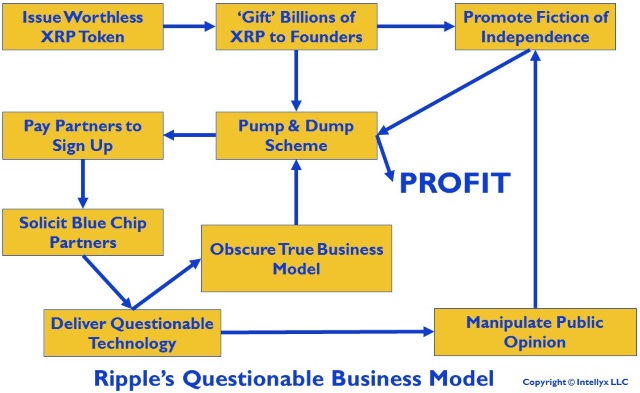In my recent article on JPM Coin, JPMorgan Chase’s prototype digital token, I casually mentioned that there are “indications that Ripple is essentially a scam.”
I had no idea the can of worms I was opening. At least a dozen articles popped up in the cryptosphere questioning my sources – and perhaps my sanity – in languages as varied as Japanese, Spanish, and even Turkish.
Needless to say, I had to dig deeper – and what I found out about Ripple was chilling.
Peeling Back the Layers of the Ripple Business Model
At its core, the Ripple business model is a pump and dump scheme, as it undergoes numerous activities to increase the value of the XRP cryptocurrency (crypto). Unlike most crypto pump and dumps, however, Ripple takes numerous steps to obscure this basic fact.
To clarify Ripple’s business model, I put together the chart below.
The starting point in the chart above is the issuance of many billions of XRP tokens – essentially printing Monopoly money out of thin air, except that you can play Monopoly with Monopoly money.
To obscure Ripple’s founders’ intentions, however, an open source ‘community’ – not technically Ripple itself – issued the tokens. “XRP is open source and it was not created by our company, so that existed as an open source technology,” explains Ryan Zagone, director of regulatory relations for Ripple. “We didn’t create XRP.”
How, then, did Ripple end up with its massive stake in XRP, amounting to well over half the available tokens? “What we do have is we do own a significant amount of XRP, it was gifted to us by some of the open-source developers that created it,” Zagone continues. “But there’s not a direct connection between Ripple the company and XRP.”
However, Zagone is being disingenuous at best, as Ripple gets a say as to who can process XRP transactions, essentially making XRP a centralized, permissioned crypto. As a result, many people in the crypto community don’t even consider XRP to be a cryptocurrency at all, because it’s not decentralized.
To read the entire article, please go to https://www.forbes.com/sites/jasonbloomberg/2019/03/01/is-ripple-a-scam/.
Intellyx publishes the biweekly Cortex newsletter, advises companies on their digital transformation initiatives, and helps vendors communicate their agility stories. As of the time of writing, none of the organizations mentioned in this article are Intellyx customers. The author does not own, nor does he intend to own, any cryptocurrency or other cryptotokens, neither long nor short. Image credit: Jason Bloomberg.





Comments
Comments are closed.